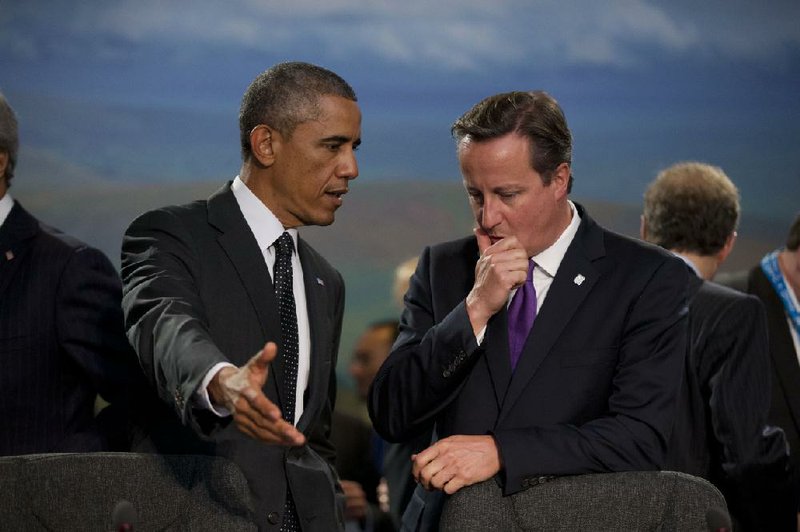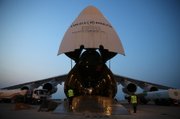NEWPORT, Wales -- President Barack Obama and British Prime Minister David Cameron pressed fellow NATO leaders Thursday to confront the "brutal and poisonous" Islamic State militant group that is wreaking havoc in Iraq and Syria -- and urged regional partners such as Jordan and Turkey to join the effort as well.
RELATED ARTICLE
http://www.arkansas…">Ukraine chief upbeat about bid for peace
RELATED ARTICLE
http://www.arkansas…">Al-Qaida says unit established in India
As leaders of the Western alliance gathered for a two-day summit, Obama and Cameron worked to begin forming a coalition of nations that could combat the extremists through military power, diplomatic pressure and economic penalties.
"Those who want to adopt an isolationist approach misunderstand the nature of security in the 21st century," they wrote in a joint editorial published as the meetings began. "Developments in other parts of the world, particularly in Iraq and Syria, threaten our security at home."
While some NATO leaders talked tough about the threat posed by the Islamic State group, the alliance made no specific pledges of action.
NATO Secretary-General Anders Fogh Rasmussen said he believed that the broader international community "has an obligation to stop the Islamic State from advancing further" and would seriously consider requests for assistance, particularly from the Iraqi government.
The Islamic State moved up the list of international priorities as the militants quickly took control of large swaths of land in Iraq this year.
The group has declared a caliphate, or Islamist nation-state, in the area it controls in Iraq and neighboring Syria. It is considered more merciless toward its enemies than the al-Qaida terror network, and intelligence officials across the world warn that with hundreds of Westerners fighting for them, it may soon seek to seed its violence beyond its declared borders.
The U.S. began launching airstrikes against Islamic State targets in Iraq last month, with Britain joining American forces in humanitarian airdrops to religious groups that had been besieged by the militants. The group's killing of two American journalists in Syria has raised discussion of targeting the group there as well.
White House officials said they did not expect NATO to commit to a military mission against the group during the summit. Still, they raised the prospect that the end of NATO's combat mission in Afghanistan -- an effort that has consumed the alliance for more than a decade -- could allow member states to focus their attention elsewhere.
Beyond direct military action, the White House said it also was seeking commitments from allies to send weapons, ammunition and other assistance to Western-backed Syrian rebels and to Iraqi forces fighting the Islamic State.
Germany moved in that direction Thursday, with the government announcing it had sent a first planeload of military equipment to the Kurds in Iraq's north, including helmets, protective vests, field glasses and mine-searching devices.
The German government also said it had decided to send assault rifles, ammunition, anti-tank weapons and armored vehicles to the Kurdish forces, but it hadn't yet set a date for the arms deliveries.
In between summit sessions on Afghanistan and Ukraine, Obama and Cameron also sought support from non-NATO nations that partner with the alliance. The president and prime minister held separate meetings Thursday with Jordan's King Abdullah II, and both planned to meet today with Turkish President Recep Tayyip Erdogan.
Obama has said repeatedly that efforts against the Islamic State would be successful only if the U.S. had support from neighbors of Iraq and Syria.
Secretary of State John Kerry and Defense Secretary Chuck Hagel, who are both with Obama in Wales, plan to travel to the Middle East next week to rally more support from regional partners.
The U.S. and Britain have been particularly concerned about the prospect that Westerners who have traveled to Syria to join the militants could return to their home countries and launch attacks. Cameron proposed new laws this week that would give police the power to seize the passports of Britons suspected of fighting alongside the extremists.
A British citizen is believed to have carried out the recent beheadings of American journalists James Foley and Steven Sotloff.
Cameron on Thursday said he hadn't ruled out joining the U.S. in airstrikes, but he added that the priority was to support the forces already fighting the militants on the ground.
"I certainly don't rule anything out, and I absolutely do think that Islamic State is a direct threat to the United Kingdom," Cameron said in an interview with the BBC before the summit. Cameron said Britain was considering directly arming the Kurdish forces in addition to continuing humanitarian aid.
Asked whether he believed that Britain would need permission from Syrian President Bashar Assad if it decided to strike Islamic State targets in that country, Cameron repeated the answer offered by White House officials when asked the same question.
"President Assad is part of the problem, not part of the solution," he said.
Chemical weapon fears
As the NATO leaders discussed their options Thursday, the U.S. ambassador to the United Nations warned that the U.S. fears that the Islamic State and other terrorists could get their hands on chemical weapons if Syria is hiding any stockpiles.
Samantha Power spoke after the U.N. Security Council received a briefing from Sigrid Kaag, who heads the international effort to rid Syria of its chemical weapons.
A joint mission of the U.N. and the Organization for the Prohibition of Chemical Weapons will wrap up at the end of the month after destroying nearly all of Syria's declared stockpile.
But Kaag said the chemical weapons organization is still working with Syria to resolve discrepancies in its declaration, which she said range from outdated records to discrepancies on the volume of materials.
Power said the U.S. is concerned not only that Assad's regime still has chemical weapons but also that any stockpiles left behind could end up in the hands of the Islamic State.
"Certainly if there are chemical weapons left in Syria, there will be a risk that those weapons fall into ISIL's hands. And we can only imagine what a group like that would do if in possession of such a weapon," Power said, referring to the militant group by one of its known acronyms.
She said the "Security Council intends to stay very much on top of this."
Syria agreed to give up its chemical arsenal last year when Obama threatened missile strikes in retaliation for a chemical attack on a rebel-held suburb of Damascus, believed to have killed more than 1,000 people. Assad's government denied involvement in the attack, blaming the rebels.
The weapons, tons of them, were destroyed aboard the U.S. cargo vessel MV Cape Ray in international waters.
Kaag said 96 percent of Syria's declared chemical weapons and related material have been destroyed, including 100 percent of the country's "priority weapons." It will take five to six months to destroy 12 remaining production facilities, she said.
But questions persist over whether Assad is hiding undeclared poison gases, and investigators are looking into reports of chlorine gas use in some Syrian towns. Chorine is not specifically classified as a chemical weapon.
There was no immediate reaction from Syria to Kaag's briefing or Power's remarks.
Captive soldiers
In neighboring Lebanon, an official said Thursday that the government is forming a crisis committee to handle the case of about two dozen members of the security forces held captive by militants in Syria.
Information Minister Ramzi Jreij said Prime Minister Tammam Salam will head the committee, which will also include the defense, finance, interior, foreign and justice ministers.
Militants, including some from the Islamic State, seized about 30 soldiers and policemen after overrunning the Lebanese border town of Arsal in early August. The militants withdrew five days later after heavy clashes with the military but took the captives with them.
Some of the hostages have since been released, but Human Rights Watch said an estimated 14 policemen and 12 soldiers are still being held.
Families of the missing have demonstrated for weeks across Lebanon to demand their release, blocking roads and setting up protest tents.
On Thursday, the families moved their demonstration to central Beirut, rallying outside the government building to demand action from the authorities. Some of the dozens of protesters held banners that read "The blood of our sons is in your hands," and "If your children were among those kidnapped ... what would you have done."
The fighting in Arsal and the resulting hostage crisis are among the most serious spillover in Lebanon from the civil war in Syria.
The Islamic State has become known for kidnapping and brutally killing those who oppose it in an effort to frighten other opponents and recruit new militants to its cause.
In Iraq on Thursday, Islamic State militants abducted about 50 men from Tal Ali, a Sunni village about 170 miles north of Baghdad, residents said. The men were loaded onto trucks and driven away, the residents said, speaking on condition of anonymity out of fear of retribution.
Meanwhile, in Baghdad, police officials said a suicide bomber rammed his explosives-laden vehicle into a police checkpoint in the Shiite neighborhood of Kazimiyah, killing 14 people, including five policemen. About 26 people were wounded and several cars were burnt in the attack.
Two hours later, a car bomb explosion in central Baghdad killed nine people and wounded 21 others, police said.
Baghdad has been on edge since the Islamic State conquered large swaths of Iraq's north, including the second-largest city, Mosul. While the fighters have stopped short of advancing on Baghdad, there has been a steady campaign of car bombs in the city.
Information for this article was contributed by Julie Pace, John-Thor Dahlburg, Danica Kirka, Geir Moulson, Alexandra Olson and staff members of The Associated Press; by Kathleen Hennessey of the Los Angeles Times; and by Patrick Donahue and Thomas Penny of Bloomberg News.
A Section on 09/05/2014



